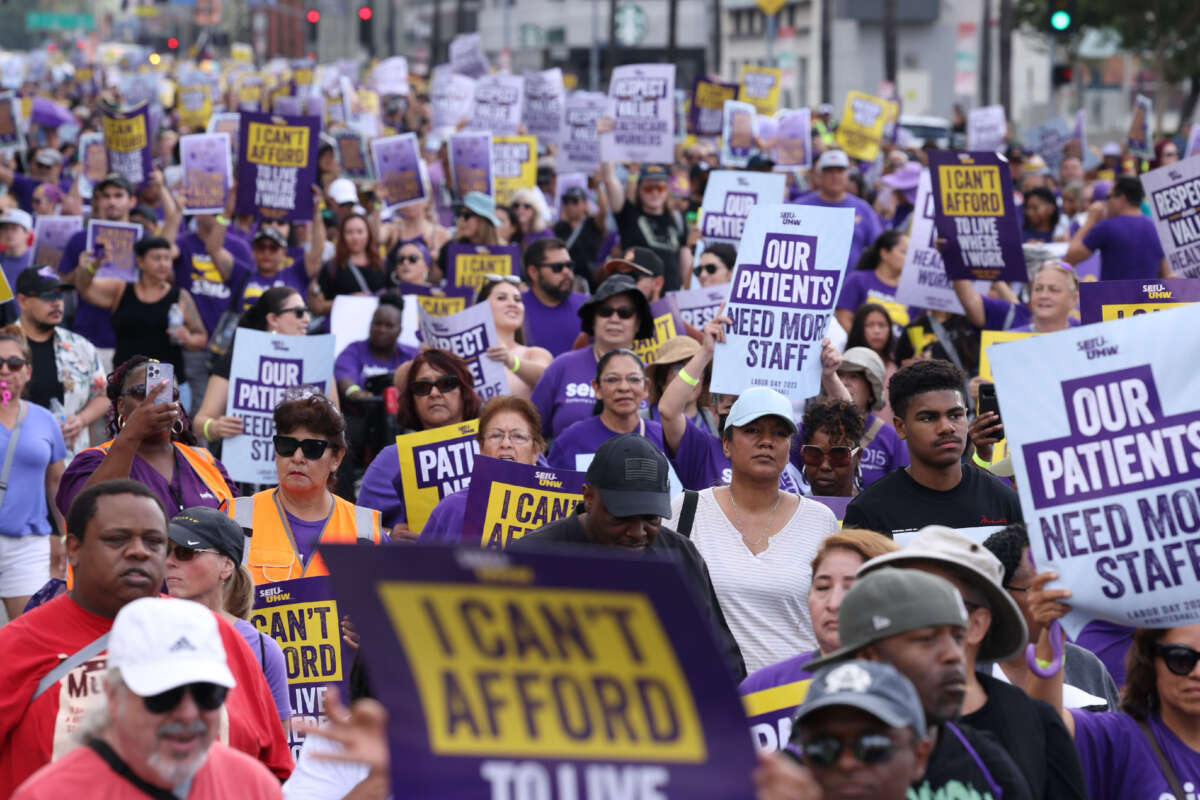Over 75,000 health care workers for Kaiser Permanente hospitals across the country began striking on Wednesday morning, launching what the union says is the largest health care strike in U.S. history after workers’ contract expired on Saturday with no new agreement in place.
The striking workers are largely concentrated in California, though thousands of workers have also walked out in Oregon, Washington and Colorado for a planned three-day strike. Meanwhile, roughly 400 workers in Washington, D.C. and Virginia are walking out for one day. Striking employees include vocational nurses, emergency department, X-ray and radiology technicians, sonographers, pharmacists, and more.
Like workers in many other recent health care strikes, Kaiser workers are frustrated with issues of understaffing, saying that Kaiser management seems to neglect patient care in favor of profits. Employees have reported being overworked and unable to properly address all of their patients’ concerns due to high patient loads and strict time constraints.
“Kaiser executives are refusing to listen to us and are bargaining in bad faith over the solutions we need to end the Kaiser short-staffing crisis,” Jessica Cruz, a licensed vocational nurse for Kaiser Los Angeles Medical Center, said in a statement.
“I see my patients’ frustrations when I have to rush them and hurry on to my next patient. That’s not the care I want to give,” Cruz continued. “We’re burning ourselves out trying to do the jobs of two or three people, and our patients suffer when they can’t get the care they need due to Kaiser’s short-staffing.”
Unions representing the workers are also fighting for higher pay, and in August asked for a $25 per hour minimum wage with raises of 7 percent in the next two years and 6.25 percent in the following two years. Kaiser has countered minimum wages of $21 and $23 an hour, depending on location, and last month proposed a two-tier wage system. The unions argue that higher wages across the board could attract more workers and help ease worker shortage issues.
The pandemic has had a huge impact on health care staffing levels across the country, and the industry has yet to bounce back. As a result, Kaiser workers say that they’ve been operating at staffing levels far lower than before the pandemic for years; Keven Dardon, a patient access representative in Clackamas, Oregon’s Sunnyside medical center, told The Guardian that his department was cut from 60 employees to 40 during the pandemic, and patients are now having to deal with long lines and delays when checking into appointments.
“It’s really taken a toll in the hospital setting and in the medical offices that we have here,” Dardon said. “That’s what we’re fighting for. Our frontline employees are demanding Kaiser Permanente executives come to the table, we’ve proposed the things that would fix the staffing issue, we’ve made tons of proposals, but because our executives just aren’t listening to us, they are just not coming to the table to even entertain those proposals.”
The Coalition of Kaiser Permanente Unions, a group of unions representing Kaiser workers, says that Kaiser executives could fix these problems if they chose to. In the first six months of this year alone, Kaiser Permanente made $3 billion in profit, and has reported making over $21 billion in profits over the last five years. Meanwhile, 49 of its executives are paid more than $1 million in salary per year.
Speaking against the authoritarian crackdown
In the midst of a nationwide attack on civil liberties, Truthout urgently needs your help.
Journalism is a critical tool in the fight against Trump and his extremist agenda. The right wing knows this — that’s why they’ve taken over many legacy media publications.
But we won’t let truth be replaced by propaganda. As the Trump administration works to silence dissent, please support nonprofit independent journalism. Truthout is almost entirely funded by individual giving, so a one-time or monthly donation goes a long way. Click below to sustain our work.
